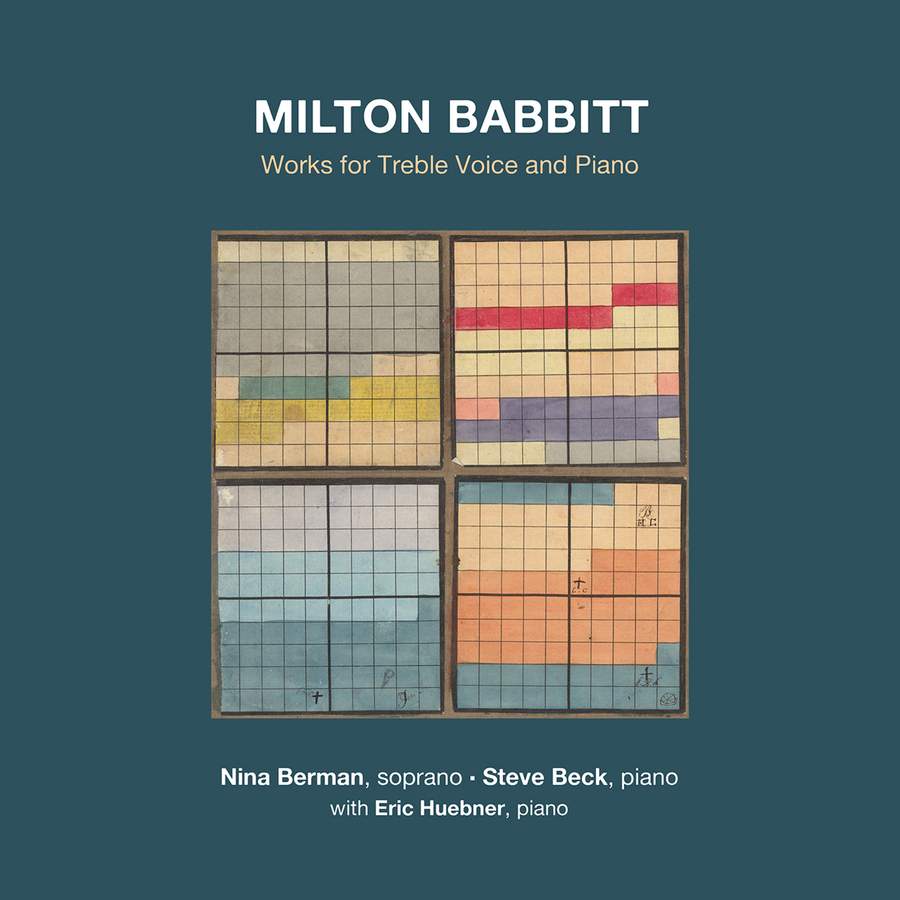BABBITT Works for Treble Voice & Piano
View record and artist detailsRecord and Artist Details
Genre:
Vocal
Label: New Focus
Magazine Review Date: 01/2023
Media Format: CD or Download
Media Runtime: 55
Mastering:
DDD
Catalogue Number: FCR349

Tracks:
| Composition | Artist Credit |
|---|---|
| The Widow's Lament in Springtime |
Milton (Byron) Babbitt, Composer
Nina Berman, Soprano Steven Beck, Piano |
| Du |
Milton (Byron) Babbitt, Composer
Nina Berman, Soprano Steven Beck, Piano |
| Sounds and Words |
Milton (Byron) Babbitt, Composer
Nina Berman, Soprano Steven Beck, Piano |
| Phonemena |
Milton (Byron) Babbitt, Composer
Nina Berman, Soprano Steven Beck, Piano |
| A Solo Requiem |
Milton (Byron) Babbitt, Composer
Eric Huebner, Piano Nina Berman, Soprano Steven Beck, Piano |
| In His Own Words |
Milton (Byron) Babbitt, Composer
Nina Berman, Soprano Steven Beck, Piano |
| The Virginal Book |
Milton (Byron) Babbitt, Composer
Nina Berman, Soprano Steven Beck, Piano |
| Pantun |
Milton (Byron) Babbitt, Composer
Nina Berman, Soprano Steven Beck, Piano |
| Now Evening, After Evening |
Milton (Byron) Babbitt, Composer
Nina Berman, Soprano Steven Beck, Piano |
Author: Liam Cagney
On this welcome complete collection of Milton Babbitt’s music for high voice and piano, the signal work for me is 1988’s ‘In His Own Words’. A song composed as a light-hearted birthday tribute to composer Mel Powell, its music is serial and its lyrics excerpts from Powell’s scholarly talks. Babbitt’s atonal music alludes to the composers referenced as lyrically they are mentioned (he quotes one of his own works, for example). But most telling is an inadvertent reference: the singer’s Sprechstimme delivery reminds us of Laurie Anderson, composer/performer of the then recent hit ‘O Superman’. Where Babbitt’s music is composed as a fustian in-joke for a small group of academics, Anderson’s embraces a wide listening public, yet keeps things heady and weird. Babbitt’s serialism had been superseded.
This might sound harsh, but it’s fair, and it doesn’t at all take away from the achievement here of Berman and Beck, whose meticulously performed survey of a chunk of Babbitt’s oeuvre had me returning for more. The chronological order allows us to hear how Babbit’s style developed (and then didn’t): from the lyrical phrasing of the 1950s to zigzag leaps two decades later. Babbitt’s choice of texts is as conservative as you’d expect: Shakespeare, Dryden, William Carlos Williams.
‘The Widow’s Lament in Springtime’ (1951) shows Babbitt in early Webern mode, with a lyrical soprano line accompanied by pointillistic piano. By 1960’s ‘Sounds and Words’, register-scraping ululations take precedence. Although not included here is Babbitt’s best-known work, ‘Philomel’ (for soprano and tape), the album does include another work for voice and electronics on tape, ‘Phonemena’, which benefits from the timbral richness of the synthesiser offsetting the harshness of the vocal part; it feels more playful, and it’s all about Berman’s astonishing performance (one of which Cathy Berberian would be proud).
Appearing on BBC television in the 1960s, Boulez counselled his music’s listeners to ‘forget all about explanations and just hear’. It’s something I find harder to do with Babbitt. The final work here, ‘Now Evening After Evening’ (2002), obstinately admits of no stylistic evolution, the vocal line reliably careening from high to low register and back again: still serial after all these years.
Discover the world's largest classical music catalogue with Presto Music.

Gramophone Digital Club
- Digital Edition
- Digital Archive
- Reviews Database
- Full website access
From £8.75 / month
Subscribe
Gramophone Full Club
- Print Edition
- Digital Edition
- Digital Archive
- Reviews Database
- Full website access
From £11.00 / month
Subscribe
If you are a library, university or other organisation that would be interested in an institutional subscription to Gramophone please click here for further information.




